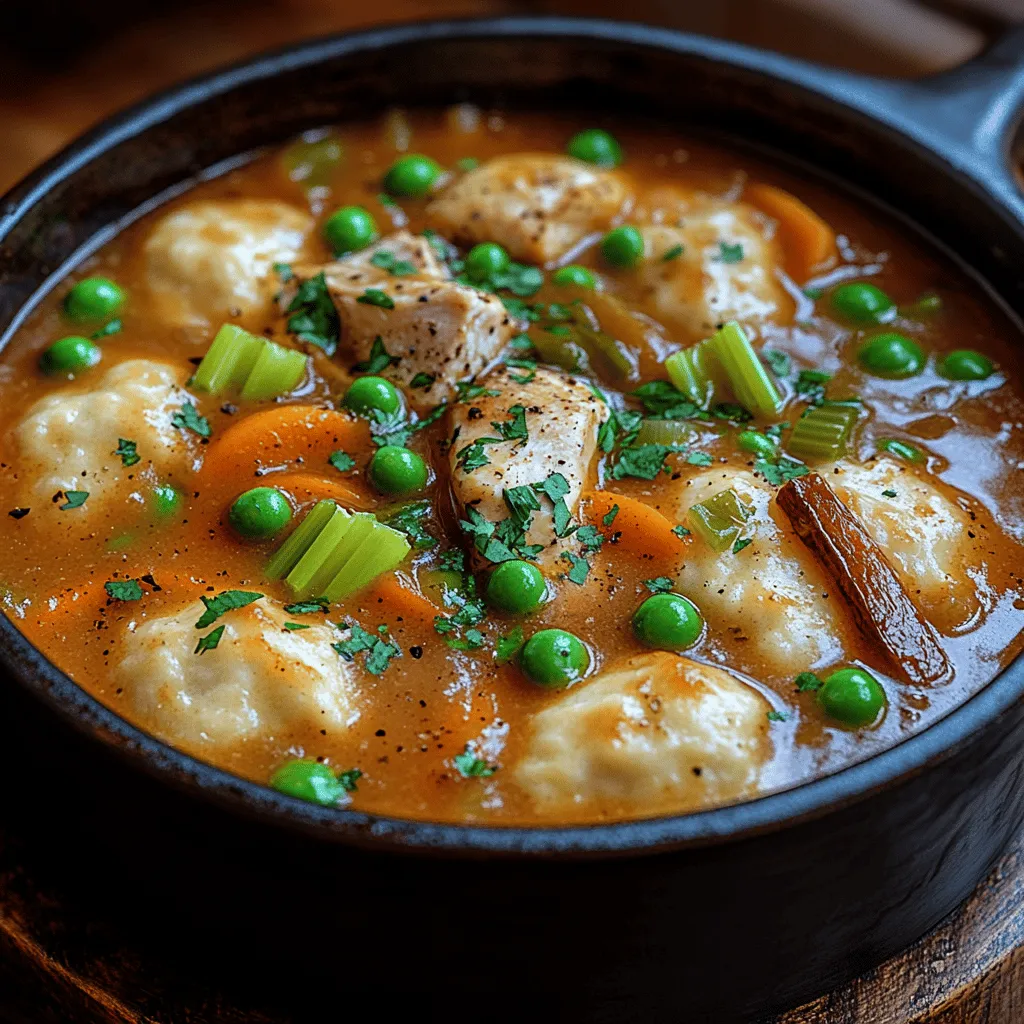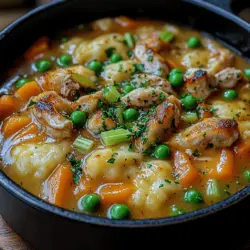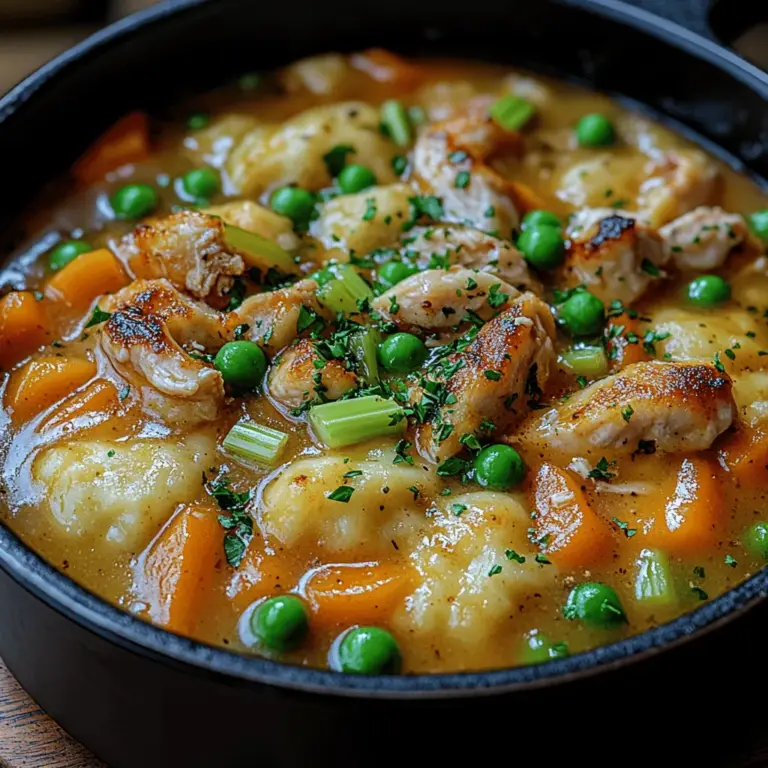Chicken and dumplings is a beloved comfort food that has warmed hearts and filled bellies for generations. This dish, with its origins deeply rooted in American culinary tradition, combines tender chicken, a rich and savory broth, and fluffy dumplings, creating a perfect harmony of flavors and textures. The simplicity of the ingredients belies the depth of flavor that can be achieved through careful preparation and cooking techniques.
In this article, we will explore not just the recipe for this comforting dish, but also its history, variations, and tips for perfecting your own chicken and dumplings at home. Whether you’re looking to recreate a family recipe or trying it for the first time, this dish promises to bring warmth and satisfaction to your table.
Understanding the Ingredients: The Building Blocks of Flavor
To create the perfect chicken and dumplings, understanding the significance of each ingredient is crucial. From the choice of chicken to the herbs and vegetables that enhance the broth, every component plays a vital role in delivering that comforting experience.
The Significance of Chicken in the Dish
When it comes to chicken and dumplings, the choice of chicken can significantly impact the dish’s overall flavor and texture. Many home cooks prefer chicken thighs over chicken breasts due to their higher fat content and richer flavor. Thighs remain moist and tender during cooking, making them an excellent choice for simmering in a broth. The skin can also add depth to the flavor of the broth when browned properly before simmering.
If you prefer chicken breasts for their leaner profile, it is essential to monitor the cooking time closely, as they can dry out more easily during the simmering process. Regardless of your preference, using fresh, high-quality chicken will always yield the best results. Look for organic or free-range options when possible, as they tend to have a more robust flavor and better texture.
The Role of Vegetables in the Broth
No comforting chicken and dumplings dish would be complete without the classic vegetable trio: onion, carrot, and celery. These aromatic vegetables form the base of the broth, providing a subtle sweetness and depth of flavor. Onions should be sautéed until translucent, releasing their natural sugars, while carrots and celery contribute their unique textures and tastes to the mix.
Additionally, many recipes incorporate peas for a pop of color and sweetness, enhancing the overall visual appeal and flavor profile. Fresh or frozen peas are both great options; just be sure to add them towards the end of the cooking process to prevent them from becoming mushy.
Herbs and Seasonings: Enhancing the Flavors
Herbs and seasonings are essential in elevating the flavor of chicken and dumplings. Thyme and parsley are traditional choices that complement the dish beautifully. Thyme’s earthy notes pair well with chicken, while parsley adds a fresh brightness that can balance the richness of the broth.
When using herbs, consider the difference between fresh and dried. Fresh herbs offer a more vibrant flavor and should be added towards the end of cooking. Dried herbs, on the other hand, are more concentrated and should be added earlier in the cooking process to allow their flavors to meld into the broth. A general rule of thumb is to use one-third the amount of dried herbs as you would fresh.
Step-by-Step Guide to Making Chicken and Dumplings
Now that we understand the foundational ingredients, it’s time to delve into the step-by-step process of making this comforting dish. Each step is designed to build layers of flavor and ensure a satisfying end result.
Preparing the Chicken and Broth
The first step in creating your chicken and dumplings is to prepare the chicken and broth. Begin by selecting your chicken pieces and ensuring they are thoroughly cleaned. If you’re using bone-in, skin-on chicken thighs, this is the perfect time to season them with salt and pepper.
In a large, heavy-bottomed pot or Dutch oven, heat a couple of tablespoons of oil over medium-high heat. Once the oil is shimmering, carefully add the chicken pieces, skin side down, and allow them to brown without moving them for about 5-7 minutes. This step is crucial as browning the chicken not only enhances the flavor through the Maillard reaction but also adds color to your broth.
Once browned, remove the chicken from the pot and set it aside. In the same pot, add chopped onions, carrots, and celery. Sauté these vegetables for about 5-6 minutes or until they become soft and aromatic. The fond, or the brown bits left in the pot from browning the chicken, will infuse the vegetables with flavor as they cook.
Simmering to Perfection
After the vegetables have softened, it’s time to reintroduce the chicken to the pot. Place the browned chicken back in along with any juices that may have accumulated on the plate. Pour in enough chicken broth to cover the chicken and vegetables. This will form the base of your flavorful broth.
Bring the mixture to a gentle boil, then reduce the heat to low and cover the pot. Allow it to simmer for about 30-40 minutes. During this time, the chicken will cook through, and the flavors from the chicken and vegetables will meld beautifully.
To check for doneness, use a meat thermometer; the internal temperature of the chicken should reach 165°F (74°C). Additionally, you can check the tenderness of the vegetables by piercing them with a fork. They should be tender but not mushy.
Creating the Dumpling Batter
While the chicken and vegetables are simmering, you can prepare the dumpling batter. The dumplings are what sets chicken and dumplings apart from other chicken soups, providing a fluffy, comforting addition to the dish.
In a mixing bowl, combine flour, baking powder, salt, and a bit of sugar. These dry ingredients create the base of your dumplings. Next, add milk and melted butter to the dry mix. Stir gently until just combined; it’s important not to overmix, as this can lead to tough dumplings. The batter should be slightly lumpy, which is perfect for achieving that light and fluffy texture.
Once your dumpling batter is ready, set it aside. You will drop spoonfuls of this batter onto the simmering broth in the next step, where they will cook and expand, soaking up all the flavorful goodness from the broth.
By taking these steps towards creating your chicken and dumplings, you are not just following a recipe; you are participating in a time-honored tradition that many families enjoy together. The warmth and comfort that this dish brings are unmatched, making it a staple for gatherings and cozy nights at home.
Stay tuned as we continue our journey into this comforting world, exploring tips for perfecting your chicken and dumplings and answering common questions that arise during the cooking process.

Importance of Not Overmixing the Batter
When preparing the dumplings for your Chicken and Dumplings dish, one of the most critical steps is to avoid overmixing the batter. Overmixing can lead to dense, chewy dumplings instead of the light, fluffy texture that we desire. The key here is to mix the ingredients just until they are combined. When the flour is incorporated with the wet ingredients, stop mixing even if there are a few lumps. These lumps are perfectly fine and will result in a tender dumpling once cooked.
Variations in Dumpling Recipes
Dumplings are wonderfully versatile, and you can experiment with various ingredients to elevate your dish. One popular variation is using buttermilk instead of regular milk. Buttermilk adds a slight tanginess and contributes to a softer texture due to its acidity, which breaks down gluten. You could also try adding herbs or spices like garlic powder or dried thyme to the dumpling mixture for extra flavor. Another option is to incorporate shredded cheese into the batter, adding richness and a delightful flavor.
Cooking the Dumplings
The process of steaming the dumplings is crucial to achieving that perfect fluffy texture. When you drop the dumplings into the simmering broth, they should be placed carefully on top of the chicken and vegetables. The steam created by the bubbling broth is what cooks the dumplings through. It’s essential to cover the pot with a lid during this time, as it traps the steam and ensures even cooking.
Common Mistakes to Avoid When Adding Dumplings to the Broth
One common mistake is adding too many dumplings at once. Overcrowding the pot can lead to uneven cooking, with some dumplings becoming gummy while others remain undercooked. Instead, add the dumplings in smaller batches, allowing them room to expand as they cook.
Another mistake to avoid is lifting the lid while the dumplings are cooking. This can disrupt the steam and cause the dumplings to collapse. Trust the cooking process and resist the urge to peek until the recommended cooking time has passed. Lastly, make sure that the broth is at a gentle simmer when you add the dumplings, as boiling can make them tough.
Serving and Presentation: Elevating the Experience
The Art of Plating Chicken and Dumplings
Presentation is key when serving Chicken and Dumplings. Begin by ladling a generous portion of the chicken and broth into wide, shallow bowls. Next, place a few dumplings atop the chicken and broth for a visually appealing arrangement.
Consider using a slotted spoon to lift the dumplings, allowing any excess broth to drain off before placing them in the bowl. This prevents the dish from becoming too soupy.
Suggestions for Garnishing with Fresh Herbs
To elevate your dish’s appearance and flavor, garnish with freshly chopped herbs. A sprinkle of parsley or chives can add a pop of color and freshness. If you’re feeling adventurous, consider using fresh thyme or dill, both of which complement the flavors of chicken beautifully.
Pairing Suggestions: What Goes Well with Chicken and Dumplings
Chicken and Dumplings is a hearty dish that pairs well with a variety of side dishes and beverages. A simple green salad with a light vinaigrette can balance the richness of the dumplings and provide a refreshing contrast.
For beverages, consider serving this dish with a crisp white wine, such as Sauvignon Blanc or Pinot Grigio. If you prefer non-alcoholic options, a sparkling water with a twist of lemon can cleanse the palate beautifully.
The Cultural Context of Serving This Dish
Chicken and Dumplings is a dish that holds significant cultural value in many households. Often associated with comfort and family gatherings, it’s a go-to meal on chilly evenings. In Southern cuisine, for example, Chicken and Dumplings is a beloved staple, often made from scratch using a rich, homemade broth.
In other cultures, variations exist that incorporate different flavors and ingredients, reflecting local culinary traditions. Understanding these cultural contexts enhances your appreciation of the dish and its place in culinary history.
Variations and Adaptations: Making It Your Own
Exploring Different Regional Takes on Chicken and Dumplings
Across the globe, Chicken and Dumplings takes on many forms. In Southern cooking, you might find dumplings that are rolled out and cut into squares, while in Chinese cuisine, you may encounter dumplings filled with chicken and vegetables, steamed to perfection.
You can also experiment with different proteins; consider using turkey or even seafood, like shrimp, for a unique twist on this classic dish. Adding seasonal vegetables, such as peas, carrots, or corn, can also enhance the flavor and nutritional profile of your meal.
Dietary Modifications
For those with dietary restrictions, Chicken and Dumplings can easily be modified. To create a gluten-free version, substitute all-purpose flour with a gluten-free flour blend. Ensure that any broth used is also gluten-free.
For a dairy-free option, substitute milk with a non-dairy alternative like almond or oat milk. And for a vegetarian version, consider using vegetable broth and replacing the chicken with hearty vegetables such as mushrooms, potatoes, and carrots.
Conclusion: Embracing Comfort in Every Bite
Chicken and Dumplings is more than just a meal; it’s a comforting tradition that brings families together. By following these detailed preparation and cooking techniques, you can create a dish that nourishes the body and warms the soul. Whether you opt for the classic version or explore unique adaptations, Chicken and Dumplings is sure to become a cherished addition to your culinary repertoire. Embrace the comfort of this dish, and enjoy the smiles it brings to your table.

